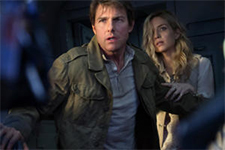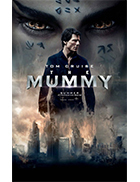The Mummy (2017)
|  The Mummy, the first installment in Universal Pictures’ planned “Dark Universe” series of interconnected remakes of its classic 1930s monster movies, is a strange beast on just about every level. The original 1932 version of The Mummy, which was directed by the great German cameraman Karl Freund and starred Boris Karloff, has already been remade twice by Universal: once in 1940 as a sort-of-sequel titled The Mummy’s Hand and, more recently, in 1999 when writer/director Stephen Sommers reimagined it as an Indiana Jones-style adventure starring Brendan Fraser at the height of his fame. Sommers’s film was hardly a hit with critics, but at least it was fun and sometimes scary and always self-deprecatingly entertaining (a Brendan Fraser specialty). It led to two diminishing sequels (2001’s The Mummy Returns and 2008’s The Mummy: Tomb of the Dragon Emperor), thus it’s not entirely surprising that Universal would choose this particular title to lead off its would-be world-building franchise: It has name-value, and in today’s world of competing cinematic multiverses, that it highly valuable. However, this new Mummy never really works because, much like The Amazing Spider-Man 2 (2014) a few years ago (which, tellingly, was co-written by Mummy director and co-scenarist Alex Kurtzman), it is so focused on laying the groundwork for future installments that it sacrifices narrative engagement in the here and now. In scene after scene we can feel how the makers are laying the groundwork for the Dark Universe, with one eye always toward all those future would-be blockbusters, which is more than enough to make one feel resentful. A foundation is being built, but it’s too obvious that the real work is focused on the bottom line (this is, of course, true of all Hollywood movies to some degree, but the good ones disguise it well). The Mummy is certainly the strangest Tom Cruise vehicle ever imagined, as there is very little about it that would seem to play to his cinematic strengths outside of its varied and multiple action sequences. Cruise has spent the past decade comfortably moving from one action movie to another, and while he has played horror before (as a centuries-old vampire in Neil Jordan’s Interview With the Vampire in 1994 and as a harried dad-turned-survivalist in Steven Spielberg’s War of the Worlds in 2005), he seems oddly placed amid The Mummy’s awkward mish-mash of CGI mayhem and horror tropes. The idea is for Cruise to play the Harrison Ford-style lovable rogue who is in just slightly over his head, but he comes across as utterly lost. The movie swallows him up whole, and had it been a better movie, that would have been okay. Cruise plays Nick Morton, a U.S. soldier/fortune hunter working in Iraq with his partner, Chris Vail (Jake Johnson). An airstrike on a village stronghold deep in the Iraqi desert reveals a vast underground chamber where an Egyptian princess named Ahmanet (Sofia Boutella) was buried alive thousands of years ago as punishment for her killing her father, the emperor, and making a pact with Set, the god of the death, for supreme power (all of which is helpfully dramatized about halfway through the film). The discovery rouses Ahmanet from her otherwise eternal imprisonment, and she goes about reanimating her wastrel, mummified body by sucking the life out of anyone and everyone around here, which turns them into shambling zombie warriors in her new army. Nick teams up with archaeologist/romantic interest Jenny Halsey (Annabelle Wallis) to fight Ahmanet, who is seeking a mystical dagger that she plans to use on Nick, whom she has marked as “the Chosen One” to become the physical vessel for Set, which means that Nick must battle her not only physically, but also psychologically because she is all up in his head. That would seem to offer an intriguing dimension of conflict, with the protagonist fighting off evil both physically and spiritually, but Cruise never manages to convey the intensity and depths of those otherworldly perils. He has neither the supreme confidence of his Mission: Impossible character Ethan Hunt, nor the visceral desperation he played so well in Spielberg’s post-9/11 take War of the Worlds; rather, he’s in some nebulous gray world in-between. Part of this is due to the film’s confused tone, which never achieves the casual jocularity of Sommers’s 1999 remake despite repeated attempts at humor, but neither does it maintain a consistent air of seriousness and gravity. Cruise is essentially stranded in the lead role, grasping for a foothold in the film’s varied assortment of tones, but never managing to find stability. Director Alex Kurtzman’s only other feature directorial outing was the familial drama People Like Us (2012), although he has been involved as writer and producer in enough cinematic tentpoles (Michael Bay’s Transformers franchise, J.J. Abrams’s Star Trek reboot, The Amazing Spider-Man 2) and major television series (Alias, Fringe, Limitless) to qualify as an expert in this terrain. The problem is that The Mummy has so much going on that Kurtzman never manages to wrangle it into coherence. Individual setpieces stand out, including a cargo plane that crashes after Ahmanet sends a flock of birds flying through the windshield and the wonderfully creepy herky-jerky nature of her bodily movements when she first emerges from her sarcophagus, but the pieces never add up to a satisfying whole. When Russell Crowe appears as Dr. Henry Jekyll, the grim, expository-included head of a clandestine organization that is dedicated to containing evil, he is a less of a plot device than he is a multi-verse plant. The rush to start setting up all the pieces comes to dominate all the rhythms, depriving The Mummy of genuine narrative involvement. Like the film’s makers, we start watching it with one eye to the future, hoping that the next Dark Universe installment will be better than this one. Copyright © 2017 James Kendrick Thoughts? E-mail James Kendrick All images copyright © Universal Pictures |
Overall Rating: 
 (2)
(2)


